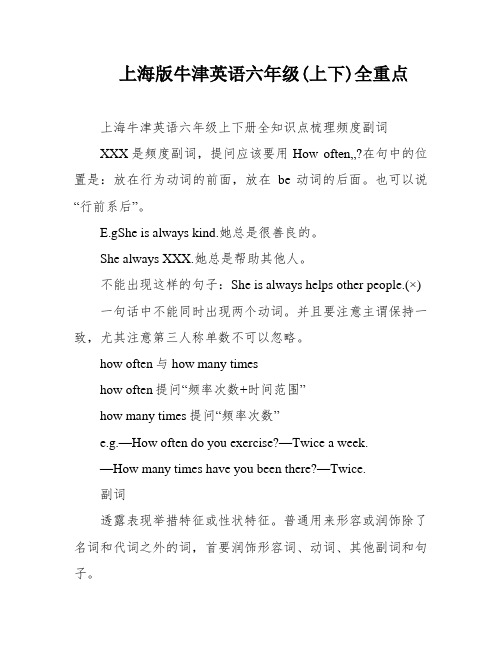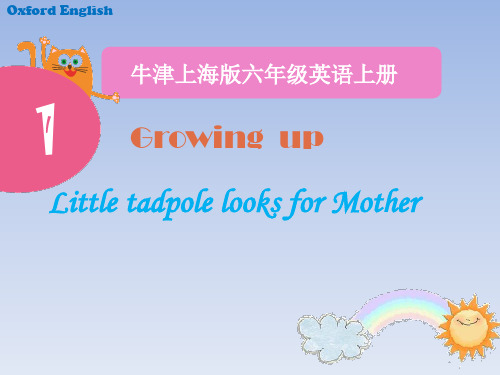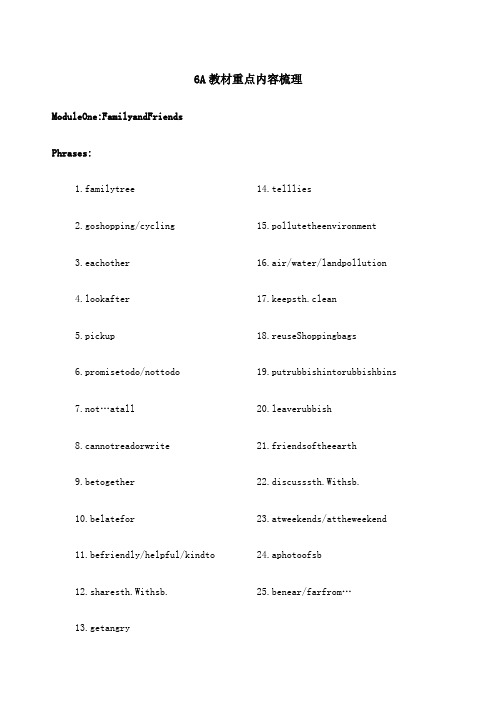牛津英语 上海版 小学六年级第一单元 语法
上海版牛津英语六年级(上下)全重点

上海版牛津英语六年级(上下)全重点上海牛津英语六年级上下册全知识点梳理频度副词XXX是频度副词,提问应该要用How often…?在句中的位置是:放在行为动词的前面,放在be动词的后面。
也可以说“行前系后”。
E.gShe is always kind.她总是很善良的。
She always XXX.她总是帮助其他人。
不能出现这样的句子:She is always helps other people.(×) 一句话中不能同时出现两个动词。
并且要注意主谓保持一致,尤其注意第三人称单数不可以忽略。
how often与how many timeshow often提问“频率次数+时间范围”how many times提问“频率次数”e.g.—How often do you exercise?—Twice a week.—How many times have you been there?—Twice.副词透露表现举措特征或性状特征。
普通用来形容或润饰除了名词和代词之外的词,首要润饰形容词、动词、其他副词和句子。
XXX happy.(修饰形容词)The old lady is XXX.(修饰动词)Luckily, he got the first prize.(润饰句子)形容词后面+ly组成副词:slow—slowlyslight—XXX—luckilyhappy—happily介词What else do you do with your…?你和你的…还干什么?With是个介词,后面接人称代词时,要用宾格的形式。
With me/him/her/it/us /them在详细的某一楼层只能用介词on,而且第几层还要用序数词On the ground floor, on the first floor, on the XXX详细的某一天介词只能用onOn Sunday, On Sunday morning,On the Open Dayhe one on the left/right左边/右边的这个the one in the middle中间的这个如果是介词短语修饰the one,应该要放在the one后面,如果是形容词应放the one的中间the left/right onethe middle oneXXX XXX在周末目前完成时现在完成时的构成是:have/has +动词的过去分词。
(沪教牛津版)六年级英语上册课件 Module 1 Unit 1(3)

I’m a daughter, a sister, a granddaughter and a cousin in my family.
Alice
son
☺ ✓
daughter
☺ ✓
brother
☺ ✓
sister
☺ ✓
grandson
☺ ✓
granddaughter ☺ ✓
cousin
☺ ✓
Paragraph 2
What do you usually do with your family?
always watch TV at night
usually play football
sometimes go to the park
go travelling every year
We always watch TV at night. I usually play football with
my sister.
I sometimes go to the park
with my grandmother and my mother. I go travelling with my
father, mother and sister every year.
Paragraph 3
Tell others that you are a happy family.
This is my family photo. There are _s_e_v_e_n_ (how many?) people in my family. They are my _g_r_a_n_d_f_a_th_e_r_, my g_r_a_n_d_m__o_t_h_e_r, my _f_a_th_e_r_, my _m_o_t_h_e_r, my _s_is_t_e_r, Rebecca, my baby _b_r_o_th_e_r_, Billy and me. We also have a _(p_e_t_)_d_o_g_.
6A上海牛津英语六年级第一学期重点词组和句型

6A上海牛津英语六年级第一学期重点词组和句型6A教材重点内容梳理ModuleOne:FamilyandFriendPhrae:1.familytree2.gohopping/cycling3.eachother4.lookafter5.pickup6.promietodo/nottodo7.not…atall8.cannotreadorwrite9.betogether10.belatefor11.befriendly/helpful/kindto12.hareth.Withb.13.getangry14.telllie15.pollutetheenvironment16.air/water/landpollution17.keepth.clean18.reueShoppingbag19.putrubbihintorubbihbin20.leaverubbih21.friendoftheearth22.dicuth.Withb.23.atweekend/attheweekend24.aphotoofb25.benear/farfrom…26.havelunch/dinner/apicnic/abarbecue27.flykite28.ridebicycle29.makeandcatle30.collecthellSentencepattern:1.A:Howmanybrother/…doyouhaveB:I(only)haveonebrother.2.A:whatdoyoudowithyour…A:Whateledoyoudowithb.3.A:Haveyoubeento…B:I havejut/alreadybeento…/there./Ihaven’tbeento…/thereyet.4.Whatabout/Howabout+n./ving…5.A:WhatdoyouuuallydoatweekendB.Iuually…6.A:I…nearorfarawayfrom…B.Itinear/farawayfrom….7.A:Wherehaveyoubeen8.B:Ihavebeento….9.Whichplacehallweviit10.Whenhallwegothere13.Howarewegoingtogetthere14.HowmuchdoeitcotModuleTwo:PlaceandActivitiePhrae:1.abankclerk2.ahopaitant3.putoutfire4.cookfood5.makeourcityaafeplace6.lookat7.litento8.arriveat9.havetea10.attheentrance11.ontheground/firtfloor12.ontheopenday13.athalfpateightinthemorning14.Firt,../Ne某t,…/Then,…/Afterthat,…/Finally,…15.takephoto16.byferry/byunderground/onfoot17.onthebu18.gotochool19.alotof/ome/afew20.livenear/farawayfromchool21.anadvertiementboard22.lightrail23.adepartmenttore24.ahouingetate25.apolicetation26.halfanhour27.waitfor28.walkonthegra29.keepquiet30.runacrotheroad31.picktheflower32.turnleft/right33.ontheright/left34.inthemiddle35.gouptairSentencepattern:1.A:Wouldyouliketobea/an…B:Ye,Iwould.//No,Iwouldn’t.A:Why/WhynotB:Iwould/wouldn’tliketobea/an…becaueI…2.A:WhatwouldyouliketobeB:Iwouldliketobe…3.A:Doyoulivenearorfarawayfrom…B:Ilivenear/farawayfrom….A:HowdoyougotochoolB:Igotochoolby…/onfoot.A:HowlongdoeittakeB:Ittake…4.A:Howlongdoeittakeyoutogetto…B:Ittakemeabout…togetthere.5.A:WhatdoeSimoneewhenheiwalkingtochoolB:Simonee...whenheiwalkingtochool.6.Whatdoethiignmean7.Wemutnoteatordrink./Don’teatordrink.8.Wemut…9.A:WhichecalatormutweueB:Wemutuetheoneinthemiddle.2ModuleThree:FoodandDrinkphrae1.friedcabbage/chickenwing2.teamedprawnwithgarlic3.boiledegg4.ahoppinglit5.atthevegetabletall6.inthefrozenfoodection7.inthemarket/upermarket8.haveapicnic9.abottleofjam10.apacketofnut11.alice/liceof12.anunhealthydiet13.doe某ercie14.liveinthecountryide15.taywithb.16.plentyof/alotof17.alittle/ome18.myfavouritebreakfat19.toomuchpicyfood20.eatinghabit21.thefoodpyramidSentencepattern:1.A:Whatwouldyoulikefordinnertonight B:I’dlike…fordinner.A:Whatkindof…wouldyoulikeWouldyoulike…or…B:I’dlike…2.A:Haveyouboughtany…B:Ye,I’veboughtome…A:Wheredidyoubuyit/themB:Inthemarket,atthe…tall/inthe…ection.A:Howmuchwait/weretheyB:Itwa/Theywere…yuan.3.A:ShallwebuyomeoftdrinkB:Ok./That’agoodidea.4.Let’buyomebreadandabottleofjam.Let’gototheupermarkettobuyomefoodanddrinkforthepicnic. 5.A:Wouldyoulikeome…B:No,thank/ye,pleae6.A:Whydoyoulike…B:Ilikeit/thembecaueit’/they’reweet/deliciou/taty/picy.7.A:WhynotB:Idon’twant…becaueititoo….8.A:MayIhaveome…,pleaeB.Ok/Sure/Allright/Ye,youmay.Hereyouare.//NO,youmaynot./I’m afraidyoucan’t..9.A:HowmuchugardoweneedeverydayB:Weneedalittleugareveryday.10.A:Whichonewahealthier/lehealthyB:…’dietwahealthierthan/lehealthythan/ahealthya/aunh ealthy a…’diet.11.Howmuch…doweneed12.Whatdoyouuuallyhaveforbreakfat/lunch/dinner13.A:Whatdidyouhaveforbreakfatyeterday3。
牛津上海版六年级英语上册Unit1Growing up ( A story Little Justin)

Thank you . See you.
1.What is Little Justin? 2.What is his mother?
tadpole
frog
Little Justin was born in the river. It is spring. He is small and black. He looks around. He cannot find his mum. Justin: Mum, where are you? Soon he has a round head and a long tail. He meets a fish in the river. She also has a round head and a long tail. Justin: Mum?
Now , Little Justin is_g_r_ee_n_. He has no _t_a_il_. He sees a _fr_o_g_. Her _e_y_es_ are big . She has a big _m_o_u_th__ and four _le_g_s_. She is _c_at_c_hi_n_g_ a fly.
She can catch flies.
Answer the questions:
1.Who was born in the river ?
Little Justin was born in the river.
2.What colour was Little Justin at first?
He was black.
Oxford English
牛津上海版六年级英语上册
A上海牛津英语六年级第一学期重点词组和句型

6A教材重点内容梳理ModuleOne:FamilyandFriendsPhrases:1.familytree2.goshopping/cycling3.eachother4.lookafter5.pickup6.promisetodo/nottodo7.not…atall8.cannotreadorwrite9.betogether10.belatefor11.befriendly/helpful/kindto12.sharesth.Withsb.13.getangry 14.telllies15.pollutetheenvironment16.air/water/landpollution17.keepsth.clean18.reuseShoppingbags19.putrubbishintorubbishbins20.leaverubbish21.friendsoftheearth22.discusssth.Withsb.23.atweekends/attheweekend24.aphotoofsb25.benear/farfrom…26.havelunch/dinner/apicnic/abar becue27.flykites 28.ridebicycles29.makesandcastles30.collectshellsSentencepatterns:1.A:Howmanybrothers/…doyouhaveB:I(only)haveonebrother.2.A:whatdoyoudowithyour…B:Ialways/usually/sometimesplaygameswith….A:Whatelsedoyoudowithsb.B:Isometimes…with…3.A:Haveyoubeento…B:Ihavejust/alreadybeento…/there./Ihaven’tbeento…/thereyet.4.Whatabout/Howabout+n./ving…5.A:WhatdoyouusuallydoatweekendsB.Iusually…6.A:Is…nearorfarawayfrom…B.Itisnear/farawayfrom….7.A:Wherehaveyoubeen8.B:Ihavebeento….9.Whichplaceshallwevisit10.Whenshallwegothere11.Whattime12.Whenarewegoingtocomeback13.Howarewegoingtogetthere14.Howmuchdoesitcost ModuleTwo:PlacesandActivities Phrases:1.abankclerk2.ashopassistant3.putoutfires4.cookfood5.makeourcityasafeplace6.lookat7.listento8.arriveat9.havetea10.attheentrance11.ontheground/firstfloor12.ontheopenday13.athalfpasteightinthemorning14.First,../Next,…/Then,…/Afte rthat,…/Finally,…15.takephotos16.byferry/byunderground/onfoot17.onthebus18.gotoschool19.alotof/some/afew20.livenear/farawayfromschool21.anadvertisementboard22.lightrail 23.adepartmentstore24.ahousingestate25.apolicestation26.halfanhour27.waitfor28.walkonthegrass29.keepquiet30.runacrosstheroad31.picktheflowers32.turnleft/right33.ontheright/left34.inthemiddle35.goupstairsSentencepatterns:1.A:Wouldyouliketobea/an…B:Yes,Iwould.//No,Iwouldn’t.A:Why/WhynotB:Iwould/wouldn’tliketobea/an…becauseI…2.A:WhatwouldyouliketobeB:Iwouldliketobe…3.A:Doyoulivenearorfarawayfrom…B:Ilivenear/farawayfrom….A:HowdoyougotoschoolB:Igotoschoolby…/onfoot.A:HowlongdoesittakeB:Ittakes…4.A:Howlongdoesittakeyoutogetto…B:Ittakesmeabout…togetthere.5.A:WhatdoesSimonseewhenheiswalkingtoschoolB:Simonsees...whenheiswalkingtoschool.6.Whatdoesthissignmean7.Wemustnoteatordrink./Don’teatordrink.8.Wemust…9.A:WhichescalatormustweuseB:Wemustusetheoneinthemiddle. ModuleThree:FoodandDrinkphrases1.friedcabbage/chickenwings2.steamedprawnswithgarlic3.boiledeggs4.ashoppinglist5.atthevegetablestall6.inthefrozenfoodsection7.inthemarket/supermarket8.haveapicnic9.abottleofjam 10.apacketofnuts11.aslice/slicesof12.anunhealthydiet13.doexercise14.liveinthecountryside15.staywithsb.16.plentyof/alotof17.alittle/some18.myfavouritebreakfast19.toomuchspicyfood20.eatinghabits21.thefoodpyramid Sentencepatterns:1.A:WhatwouldyoulikefordinnertonightB:I’dlike…fordinner.A:Whatkindof…wouldyoulikeWouldyoulike…or…B:I’dlike…2.A:Haveyouboughtany…B:Yes,I’veboughtsome…A:Wheredidyoubuyit/themB:Inthemarket,atthe…stall/inthe…section.A:Howmuchwasit/weretheyB:Itwas/Theywere…yuan.3.A:ShallwebuysomesoftdrinksB:Ok./That’sagoodidea.4.Let’sbuysomebreadandabottleofjam.Let’sgotothesupermarkettobuysomefoodanddrinkforthepicnic.5.A:Wouldyoulikesome…B:No,thanks/yes,please6.A:Whydoyoulike…B:Ilikeit/thembecauseit’s/they’resweet/delicious/tasty/spicy. 7.A:WhynotB:Idon’twant…becauseitistoo….8.A:MayIhavesome…,pleaseB.Ok/Sure/Allright/Yes,youmay.Hereyouare.//NO,youmaynot./I’mafraidyoucan’t..9.A:HowmuchsugardoweneedeverydayB:Weneedalittlesugareveryday.10.A:Whichonewashealthier/lesshealthyB:…’sdietwashealthierthan/lesshealthythan/ashealthyas/asunhealth yas…’sdiet.11.Howmuch…doweneed12.Whatdoyouusuallyhaveforbreakfast/lunch/dinner13.A:Whatdidyouhaveforbreakfastyesterday。
六年级上册英语语法讲义祈使句的用法牛津上海版(一起)

授课日期时间主题祈使句的用法学习目标1、了解祈使句的基本类型及基本用法;2、掌握祈使句的反义疑问句表达。
教学内容1.上次课后巩固练习2.预习思考教学建议:1、根据上节课预习思考的要求,让学生对自己所收集到的标识牌进行分享;2、老师引导学生根据指示牌的内容进行分类,从而总结出祈使句的基本句型。
同学们,以下图片中的祈使句表达你知道吗?我们生活中在哪些场合下会用到祈使句呢?Think about it!一、基本概念祈使句通常用来表示命令、请求、禁止、建议、警告等语气。
它的主语you(听话人)通常省略;谓语动词一律用原形;句末用惊叹号或句号;用降调来读。
二、基本分类祈使句有肯定式和否定式两种:(1) 肯定式祈使句。
它直接用动词(包括及物动词和不及物动词)原形作为句子的开头。
例如: Be careful next time. 下次细心点。
Stop speaking! Listen to me, please! 别说了!请听我说!(2) 否定祈使句。
直接在谓语动词前加don't ,即“Don't 十肯定式祈使句”即可。
表示不要做某事,后面接动词原形。
例如: Don’t walk on the grass. 不要在草地上走。
Don’t talk loudly in the library 不要在图书馆大声说话。
Don’ t turn left! 禁止左转弯!例句中turn 的意思是“改换方向,转弯”,例如:It's time we turned and went back home. 我们该返回家去了。
She turned to look at me. 她转过来看着我。
高频考点: 祈使句+and/or+一般将来时的陈述句 1. more, and you’ll improve your spoken English. A. SpeakB. SpeaksC. SpeakingD. To speak 2. Hurry up, ________ you can’t finish the work on time.A. andB. soC. butD. or祈使无主语,you 常被省去; 动原当谓语, 否定加don’t ; 朗读用降调,惊叹和句号。
牛津上海版(三起)六年级下册英语Module 1 Unit 1 You and me Period 1课件
>>Summary
1. 词汇: weigh/kilogram/centimeter/taller
2. 句型: I weigh 47 kilograms. I'm 150 centimetres tall.
>>Homework
1. 以正确的语音、语调朗读课文对话。 2.完成配套练习。 3. 预习“Look and read”。
Thank You
Make and say
>>Practice
Name: ___________________ Age: ____________________ Height(cm): _______________ Weight(kg): _______________ Hobbies: _________________
taller
Listen and say
>>Practice
Joe is visiting his cousin George in the countryside. Joe: I weigh 47 kilograms. How much do you weigh, George? George: I weigh 40 kilograms. Joe: I'm 150 centimetres tall. How tall are you?
>>Practice
Write “Joe” or “George” in the blanks.
George Joe Joe George Joe Joe
Do a survey
Name
Joe
>>Practice
Height(cm)
六年级上册英语Unit 1《Growing up》(第一课时)牛津上海版
Describ e
Describe these pictures like this.
He was a bHoeyw. as about six months Holed.was cute.
boy six months cute
baby two months big
He was a baby.
He was two months old. His eyes were big.
tadpole___________.
grow up:长大
ቤተ መጻሕፍቲ ባይዱ
It can catchf_li_e_s___. fly:苍蝇
Now she is 14 years old.Shejugnoioershigh school to_________________ .
junior high school:初中
根据图片内容,完成表格。
Age
身份
外貌特征
two months old
baby
small,cute
one year old
short,big
six years old
primary school student
fourteen years oldjunior school student tall,pretty
Warm-up
小蝌蚪水里划 划呀划呀划呀划 摇着一根小尾巴 哎呀 摇着一根小尾巴 摇呀摇 划呀划 划呀划呀划呀划 一心要去找妈妈 哎呀 一心要去找妈妈 找呀找 找到啦 啦啦啦啦找到啦 妈妈就是大青蛙 哎呀 妈妈就是大青蛙
Free talk
1.What does the tadpole(蝌蚪)look like? 2.What about you?
沪教牛津英语六年级上册Module1单元全套优秀课件
New words
month
一个月的时间; 月份
cute
可爱的
pretty
漂亮的
handsome
英俊的;帅气的
catch
逮住;捕捉
Listen and say
In Photo 1, Sally was a baby. She was about two months old. She was small and cute.
b.否定式:在be动词后加not,且was not可简写为 wasn’t, were not可简写为weren’t。
c.一般疑问句:Was I (he/she/it)…? / Were you(we/they)…?
肯定回答:Yes, I was. (you/they were.) 否定回答:No, I wasn’t. (you/they weren’t.)
__t_w_o__ months old small and cute
Language points
1. She was about two months old.她大约两个月大。
本句用到一般过去时态。一般过去时表示过 去某个时间发生的动作或存在的状态,过去习惯 性、经常性的动作、行为和过去主语的性格和所 具有的能力。
I was about seven years old. I was a student. I was short. I had short hair.
I was about seventeen years old. I was a high school student. I was tall. I had short hair.
In Photo 2, Ben was a primary school student. He
牛津英语(上海版)6年级上学期知识点罗列(1).doc
牛津英语(上海版)6年级上学期知识点罗列(1)1. family 表示家庭的时候,它是单数名词表示家庭成员的时候,它是复数名词Tom’s family is a happy one. 家庭The Wang’s family go to America every year. 家庭成员FAMILY: F ather a nd m other I l ove y ou.2. grandfather 爷爷great-grandfather 曾祖父granddaughter 孙女great-granddaughter 曾孙女3. classmate 同学deskmate 同桌workmate 同事roommate 室友schoolmate 校友4. get sth. from sb. 从某人那里得到某物He doesn’t get any money from his parents.5. 频度副词always, usually, often, sometimes, seldom, never频度副词的位置:放在行为动词之前,be动词之后I sometimes watch TV with my grandmother.He is always late for school.6. What else do you do with her?What else 还有什么Who else will he meet? 他还要见谁?Where else will you go?---- else 用于特殊疑问词之后Anything else? 还有什么东西么?Anyone else? 还有谁么?1. exciting 令人兴奋的,使人激动的---通常修饰事物excited 感到兴奋的,感到激动的---通常修饰人interesting – interestedboring – bored 无聊的surprising – surprised 惊奇的2. who 主格whom 宾格whose 所有格My grandparents usually go to see a film with my mother. 对划线部分提问Who/Whom do your grandparents usually go to see a film with?3. Watching TV is one of the most important activities of the day.动名词短语做主语。
